Lahooti lights up Larkana
The festival kicked off with performances by Shae Gill, Rajab Faqeer
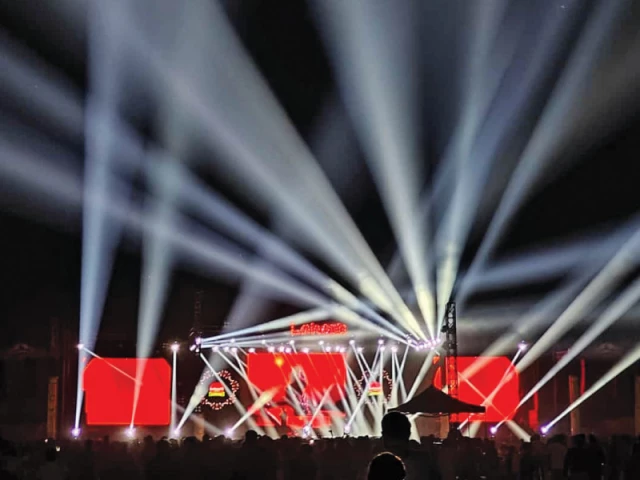
Lahooti Melo's 2025 edition made its Larkana debut this past Saturday on February 15. The first day brought out a record number in attendance and included a number of informative panel discussions as well as entertaining music performances.
Spending more than 10 hours at the event is certainly exhausting, but it gives you an experience of what Lahooti Melo is attempting to do. In recent years, the festival hasn't limited itself to one city or district but rather traveled across the province.
The intention is to rebuild a culture of arts, dialogue and music in Sindh, a region known for its rich cultural history. From Karachi to Hyderabad to Mithi and Larkana, Saif Samejo and Sana A. Khoja have gone all out in developing this brand which brings the literati, mainstream stars, artists, musicians, academics, filmmakers and everyone together under one platform. The resulting amalgam offers something for everyone. This has been the flavour of Lahooti Melo and the first-ever Larkana edition's day one was no different. It paid respect and celebrated the historical and vibrant city.
Held at the Police Training Center, one sees a massive empty ground with one smaller stage for panels. But then another huge one catches your eye. That is for the music performances in the evening.
Social narratives
In the afternoon, the first half of the event mainly consisted of panel discussions. A few dozen people gather around and listen attentively to the speakers expand on various topics.
In the session titled 'The Fate of River Indus', moderated by Nisar Khokhar, an interesting exchange of ideas took place between the speakers Afia Salam, Mohammad Ehsan Leghari and Naseer Memon. The four unravelled the politics behind the control of the mighty river, its unstable present and building of the canals, and its future.
Another session titled 'The Influence Effect: How Digital Creators shape Social and Cultural Narratives', moderated by Dr Sorath Sindhu, involved Romasa Jami, Bilal Hasan (Mysta Paki), Daniya Kanwal and Syed Kazim. Perhaps the most relevant and interesting part of the session was Romasa talking about how the social and cultural narratives are shaped, who shapes them and the effects of it on society.
A lawyer, human rights activist and writer, Romasa may have sounded like she was giving a lecture in a sociology class, discussing everyone under the sun, from Michel Foucault to Karl Marx's theories and everyone in between. However, for those willing to pay attention, her speech offered a lot of important points to ponder. It added to the appeal of her piece that she spoke about all these complex topics and explained them in Sindhi with ease. She talked about how the said narratives are formed, manipulated and used to control society by the powers that be, and cited the example of Dr Shahnawaz Kumbhar's murder and its aftermath.
Her concluding point was the main takeaway from the session, and perhaps the Melo itself.
"There will always be someone controlling the narrative," said Romasa. "But are we ready to present our counter narrative?"
As these words echo in your mind and you reflect on their impact, the sun is about to set and the party is ready to get started. You realise the crowd has grown exponentially by this time.
Music attracts Fireflies
A number of performers, local and international, get the audience grooving. Sajan Sindhi, DJ Ice, and many more set the mood. Suhaee Abro offers a powerful dance routine as she always does whereas DJ Amara Lovegna makes you want to dance like you're in Ibiza. Shae Gill makes you sway with her mellow, melodic, voice. The fireflies - phone torches - come out in droves in the audience as people express their admiration for the Pasoori vocalist.
Once you see the lineup and find out that Rajab Faqeer is going to close the show, for a moment, you question the decision. However, that changes instantly as soon as he goes on stage. It happens before he even begins the performance. You see the air in the festival change. Rajab brings an unparalleled and unexpected aura. He performs numerous ghazals and with each note, he has the crowd in the palm of his hand. You quite literally feel his connection with the people. He is the ultimate main event.
Sometime during the night, as the music thumps hard, you understand that there are two Lahooti Melos happening simultaneously. One is in front of the stage with thousands in attendance, and another one backstage.
While the crowd engages in shopping handicrafts, exploring a lineup of stalls, and consuming a variety of food, people backstage engage in interesting conversations, network, discuss potential collaborations, and well, eat a variety of food.
You find out that while the city is full of posters and billboards promoting Lahooti Melo, the first day has exceeded all expectations in terms of attendance and engagement. You are told the festival sold over 9000 tickets. However, the estimated people in attendance are over 15000. Someone in the management is surprised at the large number of women who have shown up at such a festival and even stayed until the last performance around midnight, a not-so-common sight in Larkana, according to some. In fact, a local shares how, outside of political rallies, Larkana hasn't seen such a huge festival before.
You see the steady shift in Sindh lately. People, be it through peaceful protests, social and cultural activities or dialogue, are getting their voices heard. And Lahooti Melo in Larkana definitely contributed to that.
Perhaps that is part of the beginning of the counter narrative that Romasa was talking about.

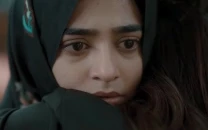
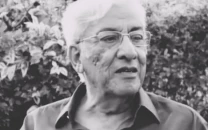
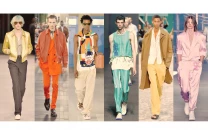

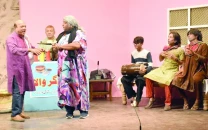
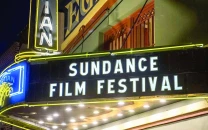












COMMENTS
Comments are moderated and generally will be posted if they are on-topic and not abusive.
For more information, please see our Comments FAQ